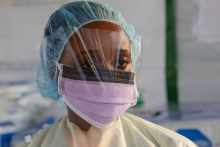Stop the Ebola outbreak NOW!

Health workers, members of PSI affiliate SOLSICO, have been at the fore of an immediate response to curtail this worrisome situation. It has been confirmed that three have died from the infection since 22 April. It was only on 12 May that the ministry of health officially declared an Ebola epidemic, reporting a morbidity of nine cases, including two deaths, at that time.
Ebola was first identified 31 years ago when there were two simultaneous outbreaks in the town of Nzara in present day South Sudan and the village of Yambuku, beside the Ebola river in the Democratic Republic of Congo, known at the time as Zaire. According to the World Health Organization, there were 24 outbreaks of EVD with 1,716 cases between 1976 and 2013. These were mainly in central Africa.
The dreadful might of Ebola was brought to global prominence by the 2013 – 2016 EVD epidemic in West Africa. With the first cases recorded in Guinea in December 2013, it spread like wildfire across the region, mainly in Guinea, Liberia and Sierra Leone. It left 11,310 deaths, out of 28,616 reported cases, in its wake.
Apart from the three most affected countries, there were fatalities in Mali, Nigeria, Senegal, Italy, Spain, United Kingdom and the United States. It was a major international health emergency which contributed to reconfiguring the way the World Health Organization’s deals with emergencies.
It also exposed major gaps in crisis preparedness, particularly for fragile health systems. This tragic situation did not just happen. It was constructed by years of promoting the neoliberal agenda of privatisation, liberalisation and deregulation of services, and cuts in the funding of social services such as health.
PSI formulated an Ebola Trade Union Response Strategy, a project which encompassed the strengthening of unions’ capacities in countries within the African region with histories of susceptibility to EVD outbreaks, to intervene in the policy process, towards building stronger, resilient public health systems.
SOLSICO in the Democratic Republic of Congo has been part of this strategy, informing its quick response. It was the union that immediately called on the ministry of health for a discussion on action to be taken to curtail the emerging outbreak. And its members have taken part in a technical session subsequently organised by the ministry on 15 May for stakeholders to develop an urgent response.
The current epidemic poses several challenges. It is presently centred in the Likati village health zone, right in the middle of the thick equatorial forest of the Aketi district. Accessibility is thus a key challenge, with Likati located thousands of kilometres away from Kinshasa, and even on the outskirts of the Bas Ulele province with a population of about one million people.
The place is very difficult to reach, and transporting equipment and intervention materials has been extremely tedious. Likati also lacks adequate numbers of health workers with the skills needed to stamp out the epidemic.
This is the time for the world to rise up as one and halt this outbreak in its tracks. We cannot afford another avoidable crisis of the proportion witnessed during the epidemic in West Africa. It is also time to reiterate the need for adequate funding of public health, including investment in the health workforce for a world where Ebola becomes just a part of humankind’s socio-medical history.
For more information on PSI’s #PublicHealth4All campaign see our campaign page.
Subscribe to PSI’s "Right to Health" newsletter (also available in French and Spanish). Send us your stories

